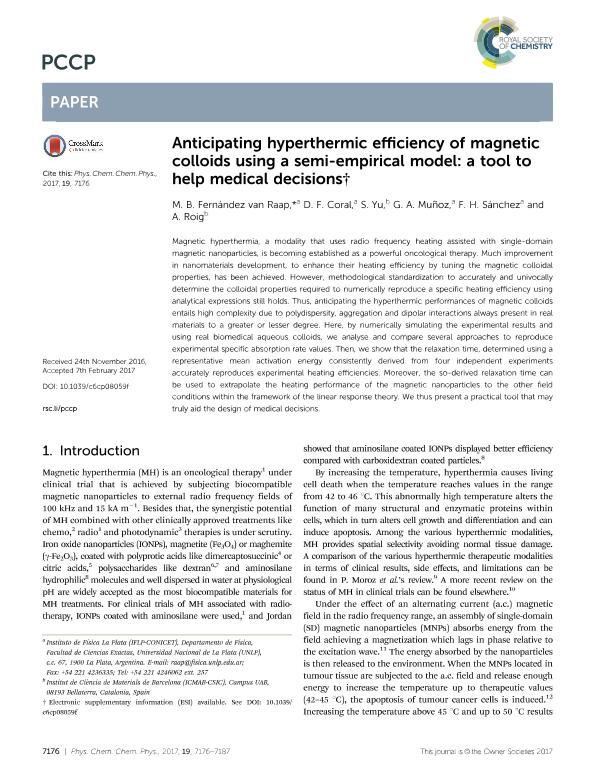Artículo
Anticipating hyperthermic efficiency of magnetic colloids using a semi-empirical model: A tool to help medical decisions
Fernández van Raap, Marcela Beatriz ; Coral, Diego Fernando
; Coral, Diego Fernando ; Yu, S.; Muñoz Medina, Guillermo Arturo
; Yu, S.; Muñoz Medina, Guillermo Arturo ; Sánchez, Francisco Homero
; Sánchez, Francisco Homero ; Roig, A.
; Roig, A.
 ; Coral, Diego Fernando
; Coral, Diego Fernando ; Yu, S.; Muñoz Medina, Guillermo Arturo
; Yu, S.; Muñoz Medina, Guillermo Arturo ; Sánchez, Francisco Homero
; Sánchez, Francisco Homero ; Roig, A.
; Roig, A.
Fecha de publicación:
01/2017
Editorial:
Royal Society of Chemistry
Revista:
Physical Chemistry Chemical Physics
ISSN:
1463-9076
Idioma:
Inglés
Tipo de recurso:
Artículo publicado
Clasificación temática:
Resumen
Magnetic hyperthermia, a modality that uses radio frequency heating assisted with single-domain magnetic nanoparticles, is becoming established as a powerful oncological therapy. Much improvement in nanomaterials development, to enhance their heating efficiency by tuning the magnetic colloidal properties, has been achieved. However, methodological standardization to accurately and univocally determine the colloidal properties required to numerically reproduce a specific heating efficiency using analytical expressions still holds. Thus, anticipating the hyperthermic performances of magnetic colloids entails high complexity due to polydispersity, aggregation and dipolar interactions always present in real materials to a greater or lesser degree. Here, by numerically simulating the experimental results and using real biomedical aqueous colloids, we analyse and compare several approaches to reproduce experimental specific absorption rate values. Then, we show that the relaxation time, determined using a representative mean activation energy consistently derived from four independent experiments accurately reproduces experimental heating efficiencies. Moreover, the so-derived relaxation time can be used to extrapolate the heating performance of the magnetic nanoparticles to the other field conditions within the framework of the linear response theory. We thus present a practical tool that may truly aid the design of medical decisions.
Palabras clave:
Magnetic Hyperthermia
,
Magnetic Nanoparticles
,
Medical Support
Archivos asociados
Licencia
Identificadores
Colecciones
Articulos(IFLP)
Articulos de INST.DE FISICA LA PLATA
Articulos de INST.DE FISICA LA PLATA
Citación
Fernández van Raap, Marcela Beatriz; Coral, Diego Fernando; Yu, S.; Muñoz Medina, Guillermo Arturo; Sánchez, Francisco Homero; et al.; Anticipating hyperthermic efficiency of magnetic colloids using a semi-empirical model: A tool to help medical decisions; Royal Society of Chemistry; Physical Chemistry Chemical Physics; 19; 10; 1-2017; 7176-7187
Compartir
Altmétricas



